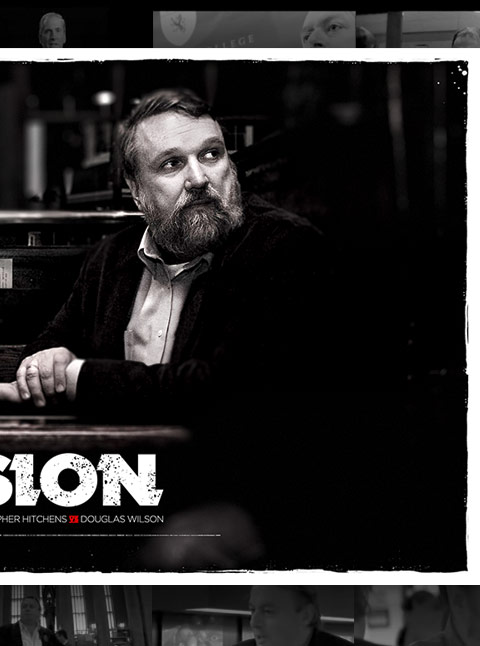 Taking a fatalistic view that was at odds with his ostensibly cheery humanism, he used to say that “if you look in playgrounds, you see the little judge and the little burglar and the little murderer and the little banker.” He tried and failed to derive consolation from religion, and once had the following exchange with Cardinal Basil Hume: Hume pontificated to him that, were there to be no God, human life would be absurd. “Well, exactly” was Mortimer’s rejoinder. (Mortimer Rests His Case)
Taking a fatalistic view that was at odds with his ostensibly cheery humanism, he used to say that “if you look in playgrounds, you see the little judge and the little burglar and the little murderer and the little banker.” He tried and failed to derive consolation from religion, and once had the following exchange with Cardinal Basil Hume: Hume pontificated to him that, were there to be no God, human life would be absurd. “Well, exactly” was Mortimer’s rejoinder. (Mortimer Rests His Case)
Canon Press recently took aboard a short debate between Christopher Hitchens and Douglas Wilson. The resulting small book is titled “Is Christianity Good for the World?” If the reader is uncertain as to how the two authors are inclined to answer this question, I suggest a preliminary perusal of the respective links. (I just switched Wilson’s link from wikipedia to his NSA page as an act of fairness, and just discovered in the new link a picture of someone wearing a gray sweater that looks a lot like the one I am currently wearing. I’ll go turn around and look in the mirror. Yep, that’s a picture of me. Notice that I am the one paying attention – further proof of my loyal Kirkship.)
 My interest in this debate is two-fold. First, I believe this debate sheds further light on the work, life, and psychology of fundamentalism’s most intriguing American leader, Douglas Wilson, as well as the beautiful world he brought forth from the dust of the earth, which I like to call – as did Wilson not long ago – the Kirk. Second, Christopher Hitchens’ reputation as one of our most important public intellectuals is further supported by the invigorating and challenging prose he provides during the course of this debate – which can be seen as a practical extension of his new book god is not Great. I will reserve my worries about god is not Great for a future entry, and for now just admit that the book is, it seems to me, one of the finest ever written. It is therefore a pleasure for me to analyze the collision of the two lives and the two positions that went into the making of this debate.
My interest in this debate is two-fold. First, I believe this debate sheds further light on the work, life, and psychology of fundamentalism’s most intriguing American leader, Douglas Wilson, as well as the beautiful world he brought forth from the dust of the earth, which I like to call – as did Wilson not long ago – the Kirk. Second, Christopher Hitchens’ reputation as one of our most important public intellectuals is further supported by the invigorating and challenging prose he provides during the course of this debate – which can be seen as a practical extension of his new book god is not Great. I will reserve my worries about god is not Great for a future entry, and for now just admit that the book is, it seems to me, one of the finest ever written. It is therefore a pleasure for me to analyze the collision of the two lives and the two positions that went into the making of this debate.
Due to Wilson’s insistent neo-presuppositionalist method (as the theowonks who hold the keys to the reformed tradition might want to call it), the argumentative course rarely veers too far from what I call the Moral Argument. The Moral Argument is based on the theist claim that morality is inescapable, while also, apart from a theistic metaphysic, inexplicable. Another way of stating it – if one would opt for oversimplification – is that if God does not exist, there is no right or wrong or good or evil.
The importance of the Moral Argument itself cannot be overstated. The debate between Christianity and atheism is in a politically strategic position. We continue to see the ramifications of fundamentalist religion throughout the world, and on the subjects of divine authority and holy writ, America now stands as the most ambivalent sovereign. The debate among Americans over theism is therefore one of the most important debates the world currently knows. The American fundamentalist now enjoys the responsibility for halting the encroaching skepticism of cosmopolitan society, not just in America, but by extension and global influence, throughout the world. And the Moral Argument is perhaps one of the theist’s most important argumentative and rhetorical tools by which to accomplish this.
In this entry (Part 2) I provide a summary of the debate between Hitchens and Wilson. In part 1 of this series I explored one of Colin Turnbull’s anthropological narratives of the Ik people in order to wrestle with what it means to say morality is ‘innate.’ In Part 3, forthcoming, I will begin my analysis of the debate.

Some of my readers might be a bit disappointed by Wilson’s literary and philosophical performance as displayed in the summary below. So I will seek to first show just how capable the Moral Argument is to stir and perplex. To accomplish this, I allow C.S. Lewis a brief moment to make the case. It turns out, the Moral Argument can be offered with at least a small dose of empathy and cogency.
C.S. Lewis’ chapter on animal pain, found in his book The Problem of Pain (1962), led to ‘The Inquiry’ of C.E.M. Joad, the head of the Department of Philosophy at the University of London. The problem Lewis and Joad were considering is often understood to be ‘The’ problem for theism: the Problem of Evil. Lewis and Joad tackle the Problem of Evil by way of a sub-question: how can an all powerful and all good God cause so much pain (‘evil’) in the non-sinful animal kingdom? Lewis concludes his reply to Dr. Joad’s inquiry with the Moral Argument:
I know that there are moments when the incessant continuity and desperate helplessness of what at least seems to be animal suffering make every argument for theism sound hollow, and when (in particular) the insect world appears to be Hell itself visibly in operation around us. Then the old indignation, the old pity arises. But how strangely ambivalent this experience is: I need not expound the ambivalence at much length, for I think I have done so elsewhere and I am sure that Dr Joad had long discerned it for himself. If I regard this pity and indignation simply as subjective experiences of my own with no validity beyond their strength at the moment (which next moment will change), I can hardly use them as standards whereby to arraign the creation. On the contrary, they become strong as arguments against God just in so far as I take them to be transcendent illumination to which creation must conform or be condemned. They are arguments against God only if they are themselves the voice of God. The more Shelleyan, the more Promethean my revolt, the more surely it claims a divine sanction. That the mere contingent Joad or Lewis, born in an area of secure and liberal civilization and imbibing from it certain humanitarian sentiments, should happen to be offended by suffering – what is that to the purpose? How will one base an argument for or against God on such an historical accident! (more…)
 In continuation of my analysis of the debate between Christopher Hitchens and Douglas Wilson, I argue that Wilson has adopted an attitude towards morality that is immoral.
In continuation of my analysis of the debate between Christopher Hitchens and Douglas Wilson, I argue that Wilson has adopted an attitude towards morality that is immoral.


 My summary of the debate between Wilson and Hitchens (Canon Press) can be found
My summary of the debate between Wilson and Hitchens (Canon Press) can be found  Taking a fatalistic view that was at odds with his ostensibly cheery humanism, he used to say that “if you look in playgrounds, you see the little judge and the little burglar and the little murderer and the little banker.” He tried and failed to derive consolation from religion, and once had the following exchange with Cardinal Basil Hume: Hume pontificated to him that, were there to be no God, human life would be absurd. “Well, exactly” was Mortimer’s rejoinder. (
Taking a fatalistic view that was at odds with his ostensibly cheery humanism, he used to say that “if you look in playgrounds, you see the little judge and the little burglar and the little murderer and the little banker.” He tried and failed to derive consolation from religion, and once had the following exchange with Cardinal Basil Hume: Hume pontificated to him that, were there to be no God, human life would be absurd. “Well, exactly” was Mortimer’s rejoinder. ( My interest in this debate is two-fold. First, I believe this debate sheds further light on the work, life, and psychology of fundamentalism’s most intriguing American leader, Douglas Wilson, as well as the beautiful world he brought forth from the dust of the earth, which I like to call – as did Wilson not long ago –
My interest in this debate is two-fold. First, I believe this debate sheds further light on the work, life, and psychology of fundamentalism’s most intriguing American leader, Douglas Wilson, as well as the beautiful world he brought forth from the dust of the earth, which I like to call – as did Wilson not long ago – 